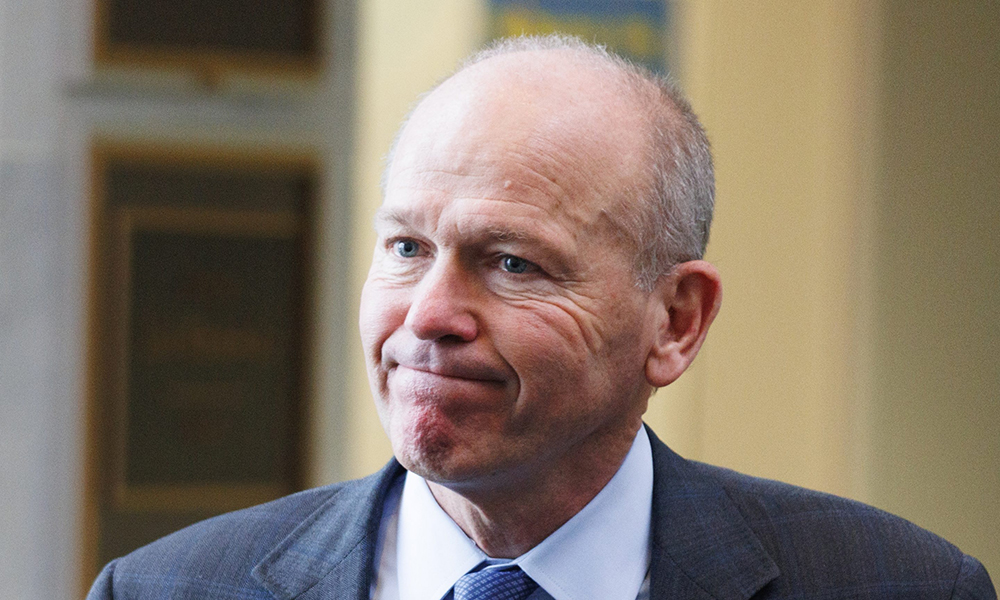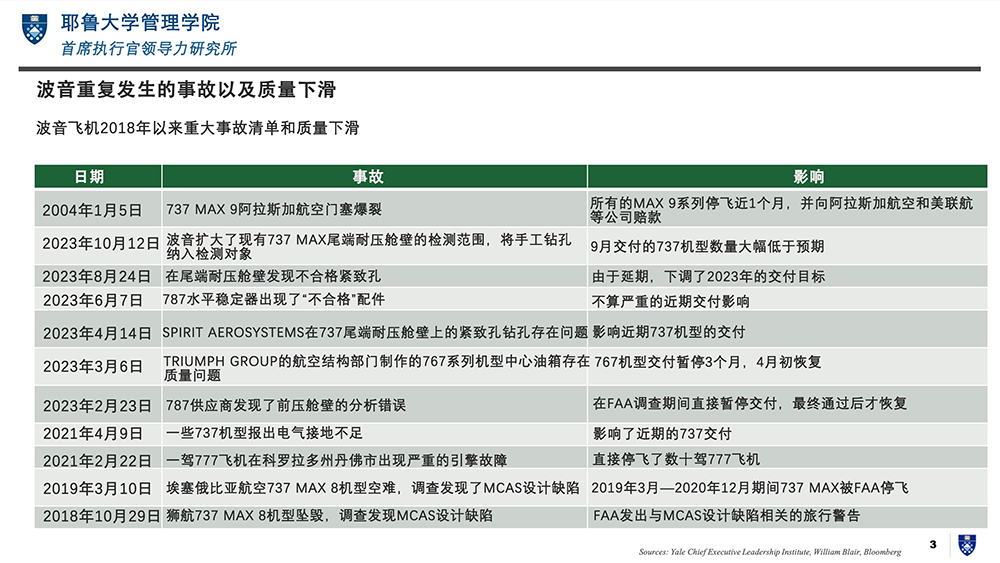
就在波音讓其飛機(jī)再次升空之際,這家公司所面臨的挑戰(zhàn)卻越發(fā)嚴(yán)峻。美國聯(lián)邦航空管理局(FAA)上周曾發(fā)表聲明,盡管波音被限飛的737 MAX機(jī)型最終回歸天空,但整個737 MAX系列的任何增產(chǎn)計劃以及其他MAX機(jī)型的監(jiān)管批準(zhǔn)都將被叫停,最主要的就是MAX 7和10機(jī)型,而這兩個機(jī)型據(jù)稱在本月早些時候發(fā)生的阿拉斯加空難之前即將獲得FAA的批準(zhǔn)。這一聲明意味著,監(jiān)管方已無法容忍波音頑固的質(zhì)量控制問題,而且這一次其態(tài)度異常堅決,并要求波音拿出系統(tǒng)性的解決方案。與此同時,波音的航空公司客戶開始公然叛逃,美聯(lián)航(United)首席執(zhí)行官斯科特·科比已經(jīng)開始與空客會談,通過購買A321來替代此前計劃新購的277架波音 737 MAX 10飛機(jī)。
此前,我們經(jīng)常表揚(yáng)波音首席執(zhí)行官大衛(wèi)·卡爾霍恩,理由是他迅速地解決了諸多前任留下來的問題,包括引導(dǎo)波音在經(jīng)歷了疫情和航空產(chǎn)業(yè)下行周期后重獲現(xiàn)金流盈利能力,修復(fù)與監(jiān)管方之間受損的關(guān)系,重啟對中國的交貨,以及減少高負(fù)債,但我們在去年還前瞻性地預(yù)測過,公司依然無法擺脫質(zhì)量控制突發(fā)事件。

1. 改變治理和內(nèi)部質(zhì)量控制流程,以便在整個機(jī)構(gòu)為安全賦能的同時讓安全理念更加深入人心
自2019年導(dǎo)致376人死亡的災(zāi)難性MAX機(jī)型空難之后,波音董事會創(chuàng)建了更加嚴(yán)苛的安全流程,包括一個特殊的由五人構(gòu)成的董事會航空安全小組委員會,并在公司設(shè)置了首席航空安全官職位。盡管安全小組委員會當(dāng)中的4人都是新董事,也就是加入董事會的時間還不到兩年(這一點倒不是很驚訝,考慮到80%的波音董事自2019年以來都已全部更換),但其資歷卻是異常耀眼,擁有廣泛的航空領(lǐng)域經(jīng)驗。這其中包括小組委員會主席、通用電氣航空(GE Aviation)前首席執(zhí)行官大衛(wèi)·喬伊斯,美國海軍前負(fù)責(zé)人約翰·理查德森上將,前大陸航空(Continental Airlines)首席執(zhí)行官勞倫斯·凱爾納,前空軍督察長史戴斯·哈里斯將軍,以及Carrier Global首席執(zhí)行官大衛(wèi)·吉特林。

卡爾霍恩任命外部安全專家來審查波音的安全流程在方向上是正確的,但FAA并不滿足于審計這一種手段,而且似乎正在推動更加徹底的永久性改革,包括直接在波音的供應(yīng)鏈中安插FAA或第三方監(jiān)控方。
2. 理順波音支離破碎的供應(yīng)鏈
各種跡象表明,波音已經(jīng)失去了對其供應(yīng)商的功能監(jiān)管和控制,而供應(yīng)鏈多元化的不到位以及責(zé)任制的缺失更是加劇了這個問題。波音與Spirit AeroSystems之間失衡的關(guān)系便是例證,而后者幾乎包攬了波音各種機(jī)型機(jī)身的生產(chǎn)工作。
多年來,我們曾前瞻性地多次警告,Spirit會給波音業(yè)務(wù)帶來潛在風(fēng)險,例如供應(yīng)鏈的“軟肋”,而且也曾警告,前首席執(zhí)行官哈里·斯通塞弗因在2005年出售Spirit而犯錯,但新的檢舉者報告稱,這種失調(diào)婚姻的糟糕程度甚至超出了我們的理解范疇。
《西雅圖時報》(Seattle Times)本周的最新報道援引了一位十分可信的匿名檢舉者提供的信息,波音工程師在過去一年中發(fā)現(xiàn)了不少于392例Spirit公司質(zhì)量控制問題。在其中一個案例中,Spirit公司的工程師理應(yīng)修復(fù)了這些問題,但波音檢察人員卻發(fā)現(xiàn)Spirit公司僅僅是“掩蓋”了有問題的部分,迫使波音不得不在公司內(nèi)部進(jìn)行進(jìn)一步的修理。還有報告講述了Spirit公司奉行的是恐懼、威嚇和成本削減文化,并不提倡雇員匯報問題,同時用大批低薪、缺乏培訓(xùn)的替代者替換了專家及資深工程師。波音以調(diào)查仍在進(jìn)行為由,拒絕回復(fù)媒體的置評請求。與此同時,Spirit公司發(fā)布了一份聲明,稱其首要關(guān)注點在于其提供的“飛機(jī)結(jié)構(gòu)的質(zhì)量和產(chǎn)品完整性”,同時還表示,公司正在與波音合作解決此事,并將遵守后續(xù)的監(jiān)管方規(guī)定。
迫于壓力,Spirit領(lǐng)導(dǎo)層在過去4個月中幾乎換了個遍,即便功勛卓著的新首席執(zhí)行官帕特·夏納罕正在全身心地應(yīng)對Spirit的流程挑戰(zhàn),但從過去20年來看,Spirit就不應(yīng)該獨立運(yùn)營,僅此而已。Spirit公司的低利潤資本密集型業(yè)務(wù)以及岌岌可危的資產(chǎn)負(fù)債表,或許會稀釋波音寶貴的自由現(xiàn)金流,但波音財務(wù)掌門人對此避而不談。盡管如此,人們不得不問,這個加起來相當(dāng)于波音市值3%的公司是否真的值得在經(jīng)營方面如此大費周章。值得一提的是,為了給Spirit續(xù)命,波音又向Spirit注資了數(shù)億美元。

3. 鞏固公眾信任,而不是將公眾溝通交給監(jiān)管方
到目前為止,卡爾霍恩在接受媒體采訪和召開全員會議時均以父親和祖父的個人口吻來強(qiáng)調(diào)安全性,同時,他也在阿拉斯加空難之后緊急與國會進(jìn)行了多次會面,并因此而受到稱贊。此外,卡爾霍恩令外界稱贊的舉措還包括,作為對首要客戶公開責(zé)難的回應(yīng),例如夏威夷航空(Hawaiian Airlines)、美聯(lián)航和瑞安航空(Ryanair)的各位首席執(zhí)行官,卡爾霍恩允許其航空公司客戶向任意波音或Spirit生產(chǎn)廠派遣檢查員。
然而,讓MAX 9系列機(jī)型回歸天空可能并不算什么難事。未來數(shù)個月,F(xiàn)AA將對波音內(nèi)部流程挑戰(zhàn)開展長期深入的監(jiān)管,受此影響,卡爾霍恩掌控輿論并繼續(xù)鞏固公眾信任的難度就會越來越大。
當(dāng)波音在此前面臨類似的長期監(jiān)管審查時,卡爾霍恩的一些前任曾獲得過一些不明智的建議:用極為模糊、冷淡的法律術(shù)語來搪塞監(jiān)管方和調(diào)查員,均以失敗告終。這一次,波音的挑戰(zhàn)更為嚴(yán)峻,因為未來幾個月波音將不得不做出一些困難卻十分必要的取舍。例如,即便波音一再聲稱生產(chǎn)和交付更多的MAX機(jī)型是其首要任務(wù),但很多分析師認(rèn)為波音可能需要調(diào)低其在數(shù)個月之前剛發(fā)布的靚麗生產(chǎn)和財務(wù)目標(biāo),而且有可能有必要在萬眾期待的周三電話會議上對業(yè)績指引三緘其口。一些人還提到,出于責(zé)任制的考慮,應(yīng)對公司內(nèi)部進(jìn)行重組。
法官路易斯·布蘭代斯的名言“陽光是最好的消毒劑”用在這里是再合適不過了。無論投資者或律師如何分說,公共安全和鞏固公眾信任的優(yōu)先級必須高于一切短期商業(yè)影響。如果波音能夠采取強(qiáng)硬的必要舉措,并讓外界認(rèn)為這一舉措并非意氣用事或內(nèi)斗,而是為了重塑自身信譽(yù)所采取的廣泛戰(zhàn)略計劃的一部分,那么就可以避免出現(xiàn)一些不必要的市場恐慌、員工疑惑以及情緒性投機(jī)行為。
此外,展現(xiàn)有責(zé)任心的人性化領(lǐng)導(dǎo)力,而不是拿官僚流程或讓下屬來背鍋來搪塞,將大大有助于減少負(fù)面新聞的影響。
很多航空公司高管如今都在開玩笑說,那句老話“要不是有波音的話,我是不會去的”,說不定會變成“要是有波音的話,我是不會去的”,除非波音能夠盡快重振其安全文化。波音今后將何去何從?這基本上取決于人們?nèi)绾慰创ㄒ簟且患夷軌蜃岋w機(jī)安全飛行的公司,還是一家眼高手低的公司。(財富中文網(wǎng))
杰弗瑞·索能菲爾德(Jeffrey Sonnenfeld )是耶魯大學(xué)管理學(xué)院萊斯特·克朗管理實踐教授兼高級副院長。他被《Poets & Quants》雜志評選為“年度管理學(xué)教授”。
史蒂文·田(Steven Tian)是耶魯大學(xué)首席首席執(zhí)行官領(lǐng)導(dǎo)力研究所的研究主任,亦是洛克菲勒家族理財室前量化投資分析師。
譯者:馮豐
審校:夏林
就在波音讓其飛機(jī)再次升空之際,這家公司所面臨的挑戰(zhàn)卻越發(fā)嚴(yán)峻。美國聯(lián)邦航空管理局(FAA)上周曾發(fā)表聲明,盡管波音被限飛的737 MAX機(jī)型最終回歸天空,但整個737 MAX系列的任何增產(chǎn)計劃以及其他MAX機(jī)型的監(jiān)管批準(zhǔn)都將被叫停,最主要的就是MAX 7和10機(jī)型,而這兩個機(jī)型據(jù)稱在本月早些時候發(fā)生的阿拉斯加空難之前即將獲得FAA的批準(zhǔn)。這一聲明意味著,監(jiān)管方已無法容忍波音頑固的質(zhì)量控制問題,而且這一次其態(tài)度異常堅決,并要求波音拿出系統(tǒng)性的解決方案。與此同時,波音的航空公司客戶開始公然叛逃,美聯(lián)航(United)首席執(zhí)行官斯科特·科比已經(jīng)開始與空客會談,通過購買A321來替代此前計劃新購的277架波音 737 MAX 10飛機(jī)。
此前,我們經(jīng)常表揚(yáng)波音首席執(zhí)行官大衛(wèi)·卡爾霍恩,理由是他迅速地解決了諸多前任留下來的問題,包括引導(dǎo)波音在經(jīng)歷了疫情和航空產(chǎn)業(yè)下行周期后重獲現(xiàn)金流盈利能力,修復(fù)與監(jiān)管方之間受損的關(guān)系,重啟對中國的交貨,以及減少高負(fù)債,但我們在去年還前瞻性地預(yù)測過,公司依然無法擺脫質(zhì)量控制突發(fā)事件。
FAA已將波音列入了觀察名單,而且也順帶著讓卡爾霍恩成為了熱鍋上的螞蟻。對于這位心煩意亂的首席執(zhí)行官來說,重塑波音的信譽(yù)成為了最為重要和緊迫的事項。卡爾霍恩與過去30年中的六位波音首席執(zhí)行官都相熟,曾親眼目睹了波音的多個發(fā)展階段,甚至包括波音收購麥克唐納-道格拉斯公司(McDonnell-Douglas)之前的歷史。我們建議卡爾霍恩應(yīng)采取以下三個具體舉措,來重振波音的安全文化,同時,我們還給出了用于支撐我們建議的一些原始數(shù)據(jù)。
1. 改變治理和內(nèi)部質(zhì)量控制流程,以便在整個機(jī)構(gòu)為安全賦能的同時讓安全理念更加深入人心
自2019年導(dǎo)致376人死亡的災(zāi)難性MAX機(jī)型空難之后,波音董事會創(chuàng)建了更加嚴(yán)苛的安全流程,包括一個特殊的由五人構(gòu)成的董事會航空安全小組委員會,并在公司設(shè)置了首席航空安全官職位。盡管安全小組委員會當(dāng)中的4人都是新董事,也就是加入董事會的時間還不到兩年(這一點倒不是很驚訝,考慮到80%的波音董事自2019年以來都已全部更換),但其資歷卻是異常耀眼,擁有廣泛的航空領(lǐng)域經(jīng)驗。這其中包括小組委員會主席、通用電氣航空(GE Aviation)前首席執(zhí)行官大衛(wèi)·喬伊斯,美國海軍前負(fù)責(zé)人約翰·理查德森上將,前大陸航空(Continental Airlines)首席執(zhí)行官勞倫斯·凱爾納,前空軍督察長史戴斯·哈里斯將軍,以及Carrier Global首席執(zhí)行官大衛(wèi)·吉特林。
然而,持續(xù)不斷的突發(fā)安全問題意味著董事會的決議明顯沒有完全落實到生產(chǎn)和裝配線,而且這個挑戰(zhàn)并非只是出現(xiàn)某起事故那么簡單。新的質(zhì)量控制流程在波音生產(chǎn)廠的落實到位程度依然是個未知的問題。有人懷疑,專注于安全的聲音是否在內(nèi)部得到了充分重視。一份檢舉報告稱,波音自有的質(zhì)量控制體系經(jīng)常會遭到忽視,因為重壓之下的生產(chǎn)線檢查員有時候會提供偽造或錯誤的信息,與之相印證的是,公司長期存在的投資不足和自我監(jiān)控不足的投訴。
卡爾霍恩任命外部安全專家來審查波音的安全流程在方向上是正確的,但FAA并不滿足于審計這一種手段,而且似乎正在推動更加徹底的永久性改革,包括直接在波音的供應(yīng)鏈中安插FAA或第三方監(jiān)控方。
2. 理順波音支離破碎的供應(yīng)鏈
各種跡象表明,波音已經(jīng)失去了對其供應(yīng)商的功能監(jiān)管和控制,而供應(yīng)鏈多元化的不到位以及責(zé)任制的缺失更是加劇了這個問題。波音與Spirit AeroSystems之間失衡的關(guān)系便是例證,而后者幾乎包攬了波音各種機(jī)型機(jī)身的生產(chǎn)工作。
多年來,我們曾前瞻性地多次警告,Spirit會給波音業(yè)務(wù)帶來潛在風(fēng)險,例如供應(yīng)鏈的“軟肋”,而且也曾警告,前首席執(zhí)行官哈里·斯通塞弗因在2005年出售Spirit而犯錯,但新的檢舉者報告稱,這種失調(diào)婚姻的糟糕程度甚至超出了我們的理解范疇。
《西雅圖時報》(Seattle Times)本周的最新報道援引了一位十分可信的匿名檢舉者提供的信息,波音工程師在過去一年中發(fā)現(xiàn)了不少于392例Spirit公司質(zhì)量控制問題。在其中一個案例中,Spirit公司的工程師理應(yīng)修復(fù)了這些問題,但波音檢察人員卻發(fā)現(xiàn)Spirit公司僅僅是“掩蓋”了有問題的部分,迫使波音不得不在公司內(nèi)部進(jìn)行進(jìn)一步的修理。還有報告講述了Spirit公司奉行的是恐懼、威嚇和成本削減文化,并不提倡雇員匯報問題,同時用大批低薪、缺乏培訓(xùn)的替代者替換了專家及資深工程師。波音以調(diào)查仍在進(jìn)行為由,拒絕回復(fù)媒體的置評請求。與此同時,Spirit公司發(fā)布了一份聲明,稱其首要關(guān)注點在于其提供的“飛機(jī)結(jié)構(gòu)的質(zhì)量和產(chǎn)品完整性”,同時還表示,公司正在與波音合作解決此事,并將遵守后續(xù)的監(jiān)管方規(guī)定。
迫于壓力,Spirit領(lǐng)導(dǎo)層在過去4個月中幾乎換了個遍,即便功勛卓著的新首席執(zhí)行官帕特·夏納罕正在全身心地應(yīng)對Spirit的流程挑戰(zhàn),但從過去20年來看,Spirit就不應(yīng)該獨立運(yùn)營,僅此而已。Spirit公司的低利潤資本密集型業(yè)務(wù)以及岌岌可危的資產(chǎn)負(fù)債表,或許會稀釋波音寶貴的自由現(xiàn)金流,但波音財務(wù)掌門人對此避而不談。盡管如此,人們不得不問,這個加起來相當(dāng)于波音市值3%的公司是否真的值得在經(jīng)營方面如此大費周章。值得一提的是,為了給Spirit續(xù)命,波音又向Spirit注資了數(shù)億美元。
波音也不是沒有希望,幾乎所有的供應(yīng)商都嚴(yán)重依賴波音,因此他們都在齊心協(xié)力、斗志昂揚(yáng)地以最快的方式來解決這些久拖未決的底層結(jié)構(gòu)性挑戰(zhàn)。就像丘吉爾說過的那句老話一樣,“絕不要浪費一次好的危機(jī)。”
3. 鞏固公眾信任,而不是將公眾溝通交給監(jiān)管方
到目前為止,卡爾霍恩在接受媒體采訪和召開全員會議時均以父親和祖父的個人口吻來強(qiáng)調(diào)安全性,同時,他也在阿拉斯加空難之后緊急與國會進(jìn)行了多次會面,并因此而受到稱贊。此外,卡爾霍恩令外界稱贊的舉措還包括,作為對首要客戶公開責(zé)難的回應(yīng),例如夏威夷航空(Hawaiian Airlines)、美聯(lián)航和瑞安航空(Ryanair)的各位首席執(zhí)行官,卡爾霍恩允許其航空公司客戶向任意波音或Spirit生產(chǎn)廠派遣檢查員。
然而,讓MAX 9系列機(jī)型回歸天空可能并不算什么難事。未來數(shù)個月,F(xiàn)AA將對波音內(nèi)部流程挑戰(zhàn)開展長期深入的監(jiān)管,受此影響,卡爾霍恩掌控輿論并繼續(xù)鞏固公眾信任的難度就會越來越大。
當(dāng)波音在此前面臨類似的長期監(jiān)管審查時,卡爾霍恩的一些前任曾獲得過一些不明智的建議:用極為模糊、冷淡的法律術(shù)語來搪塞監(jiān)管方和調(diào)查員,均以失敗告終。這一次,波音的挑戰(zhàn)更為嚴(yán)峻,因為未來幾個月波音將不得不做出一些困難卻十分必要的取舍。例如,即便波音一再聲稱生產(chǎn)和交付更多的MAX機(jī)型是其首要任務(wù),但很多分析師認(rèn)為波音可能需要調(diào)低其在數(shù)個月之前剛發(fā)布的靚麗生產(chǎn)和財務(wù)目標(biāo),而且有可能有必要在萬眾期待的周三電話會議上對業(yè)績指引三緘其口。一些人還提到,出于責(zé)任制的考慮,應(yīng)對公司內(nèi)部進(jìn)行重組。
法官路易斯·布蘭代斯的名言“陽光是最好的消毒劑”用在這里是再合適不過了。無論投資者或律師如何分說,公共安全和鞏固公眾信任的優(yōu)先級必須高于一切短期商業(yè)影響。如果波音能夠采取強(qiáng)硬的必要舉措,并讓外界認(rèn)為這一舉措并非意氣用事或內(nèi)斗,而是為了重塑自身信譽(yù)所采取的廣泛戰(zhàn)略計劃的一部分,那么就可以避免出現(xiàn)一些不必要的市場恐慌、員工疑惑以及情緒性投機(jī)行為。
此外,展現(xiàn)有責(zé)任心的人性化領(lǐng)導(dǎo)力,而不是拿官僚流程或讓下屬來背鍋來搪塞,將大大有助于減少負(fù)面新聞的影響。
很多航空公司高管如今都在開玩笑說,那句老話“要不是有波音的話,我是不會去的”,說不定會變成“要是有波音的話,我是不會去的”,除非波音能夠盡快重振其安全文化。波音今后將何去何從?這基本上取決于人們?nèi)绾慰创ㄒ簟且患夷軌蜃岋w機(jī)安全飛行的公司,還是一家眼高手低的公司。(財富中文網(wǎng))
杰弗瑞·索能菲爾德(Jeffrey Sonnenfeld )是耶魯大學(xué)管理學(xué)院萊斯特·克朗管理實踐教授兼高級副院長。他被《Poets & Quants》雜志評選為“年度管理學(xué)教授”。
史蒂文·田(Steven Tian)是耶魯大學(xué)首席首席執(zhí)行官領(lǐng)導(dǎo)力研究所的研究主任,亦是洛克菲勒家族理財室前量化投資分析師。
譯者:馮豐
審校:夏林
Paradoxically, just as Boeing is getting its planes back in the air, its challenges are only getting more serious. The FAA’s announcement last week–that while Boeing’s grounded 737 MAX 9 jets are finally returning to the skies, there will be a complete halt on any production increases for the entire 737 MAX program and any new regulatory approvals for additional MAX lines, most notably the MAX 7 and 10, which were reportedly nearing FAA approval right before the Alaska Air accident earlier this month–suggests that regulators are running out of patience for Boeing’s persistent quality control woes and are putting the foot down this time, demanding systemic fixes. Meanwhile, Boeing’s airline customers are in open revolt: United’s CEO Scott Kirby has already begun talks with Airbus about substituting A321 purchases for their formerly planned new 277 Boeing 737 Max 10 purchases.
We’ve often praised Boeing CEO Dave Calhoun for navigating deftly through a slew of inherited challenges, including guiding Boeing back to cash flow profitability out of COVID and the aerospace cyclical downturn, repairing damaged relations with regulators, restarting deliveries to China, and reducing high indebtedness–but we also presciently predicted last year that quality control flare-ups would prove persistent.
With the FAA putting Boeing on probation, and by extension, Calhoun on the hot seat, restoring Boeing’s credibility has become the embattled CEO’s single most important and urgent mandate. Having known the last six CEOs of Boeing personally going back three decades, and having closely observed Boeing through many life stages even before the McDonnell Douglas merger, here are three concrete steps Calhoun should take to revive Boeing’s safety culture, along with an accompanying slide deck of original data supporting our recommendations.
1. Change governance and internal quality control processes to empower and embed safety more deeply across the organization
After the devastating 2019 MAX crashes that resulted in 376 deaths, the Boeing board established heightened safety processes, including a special five-person Aerospace Safety Subcommittee of the Board, as well as a Chief Aerospace Safety Officer within the company. Although four of the five members of the Safety Subcommittee are new board members with less than two years of experience (which is hardly surprising considering that 80% of Boeing’s board has turned over since 2019), their credentials are undoubtedly sterling, drawing across extensive aerospace sector experience. These include Subcommittee Chair and former CEO of GE Aviation David Joyce, former head of the U.S. Navy Adm. John Richardson, former CEO of Continental Airlines Lawrence Kellner, former Inspector General of the Air Force Gen. Stayce Harris, and Carrier Global CEO David Gitlin.
Yet the continued flare-up of safety issues means that something is evidently getting lost in translation between the board and the manufacturing and assembly lines–and the challenge runs much deeper than any single incident. How deeply the new quality control processes have permeated into Boeing’s production plants is an open question. One wonders whether safety-focused voices are sufficiently empowered internally, as one whistleblower report claimed that Boeing’s own quality control systems were routinely ignored with under-pressure line inspectors sometimes providing false or erroneous information, which would be consistent with long-running complaints of underinvestment and inadequate self-policing.
Calhoun’s appointment of an external safety expert to review Boeing’s safety processes is a step in the right direction–but the FAA appears to be pushing for more wholesale and permanent changes, including embedding FAA or third-party monitors directly across Boeing’s supply chain, unsatisfied with mere auditing.
2. Clean up Boeing’s broken supply chain
By all appearances, Boeing has lost functional oversight and control over its suppliers, an issue that has been exacerbated by a lack of supply chain diversification and accountability. This is embodied by Boeing’s dysfunctional relationship with Spirit AeroSystems, which manufactures virtually all of Boeing’s fuselages.
For years, we have presciently and repeatedly warned about the latent risk posed by Spirit to Boeing’s operations, as the “soft underbelly” in the supply chain, and how former CEO Harry Stonecipher made a mistake by selling Spirit in 2005–but new whistleblower reports suggest that this dysfunctional marriage may be even worse than we appreciated.
According to a fresh report in the Seattle Times this week, citing an anonymous but credible whistleblower, Boeing engineers found no less than 392 instances of Spirit quality control failures over the last year. In one instance, Spirit’s engineers supposedly repaired the issues, only for the Boeing inspector to discover that Spirit merely “painted over” the problematic parts, forcing Boeing to do any further repairs in-house. Additional reports document how Spirit employees were encouraged not to report problems amidst a culture of fear, intimidation, and cost-cutting, with expert veteran engineers replaced by legions of cheaper and undertrained replacements. Boeing has refused to respond to media requests for comment, citing ongoing investigations. Meanwhile, Spirit has issued a statement saying that their primary focus is “the quality and product integrity of the aircraft structures” they deliver, adding that the company was working with Boeing on the matter and following regulators’ protocols.
Although the Spirit leadership ranks have almost completely turned over in the last four months amidst apparent pressure, and even if accomplished new CEO Pat Shanahan is committed to fixing Spirit’s process challenges, the last 20 years have shown that Spirit should not be a standalone company, period. No matter how much Boeing’s financial whiz kids resist the prospect of diluting Boeing’s prized free cash flow with Spirit’s low-margin, capital-intensive business, and wobbly balance sheet, one has to wonder whether a sum equivalent to 3% of Boeing’s market capitalization is worth all the operational headaches, especially as Boeing continues to inject hundreds of millions into Spirit to keep it afloat.
The silver lining here for Boeing is that almost all of its suppliers are heavily dependent on Boeing and thus, all are aligned and motivated to urgently fix these underlying, long-deferred structural challenges together. As the old Churchill saying goes, “Never let a good crisis go to waste.”
3. Fortify public trust instead of deferring to regulators in communicating with the public
So far, Calhoun has won plaudits for his reassuring media interviews, all-staff meetings where he spoke about safety in personal terms as a father and grandfather, and desperately needed meetings with Congress in the days after the Alaska Air incident. Similarly, Calhoun was praised for letting his airline customers send inspectors to any Boeing or Spirit manufacturing plant in response to the public condemnations of major customers such as the CEOs of Hawaiian, United, and Ryanair.
But getting the MAX 9s back into the sky may have been the easy part. As the FAA digs in for protracted, intrusive oversight into Boeing’s internal process challenges in the months ahead, it will become progressively harder for Calhoun to control the narrative and continue fortifying public trust.
When Boeing faced similarly protracted regulatory reviews before, some of Calhoun’s predecessors of were ill-advised to hide behind exceedingly vague, impersonal legalese in deference to regulators and investigators–which did not end well. This time around, Boeing’s challenge is even more acute since there will almost certainly need to be difficult but necessary tradeoffs in the months ahead. For example, even though Boeing has said repeatedly that building and delivering more MAXs is their top priority this year, many analysts consider it likely that Boeing will need to lower the lofty production and financial targets laid out merely months ago, and will likely need to withhold guidance during its highly anticipated earnings call on Wednesday. Some have also floated the prospect of internal reorganizations as accountability beckons.
Now more than ever, Justice Louis Brandeis’ quip that “sunlight is the best disinfectant” rings true. Public safety and fortifying public trust must outweigh all short-term commercial impacts, no matter what investors or lawyers say. Needless market panic, employee confusion, and sensationalized speculation can be avoided if tough but necessary moves are packaged and perceived as a part of a broader strategic plan to restore Boeing’s credibility, rather than being seen as reactionary impulsiveness or palace intrigue.
Furthermore, showing an accountable human face of leadership–rather than hiding behind bureaucratic processes or delegating bad news to subordinates–can go a long way in making bad news more palatable.
Many airline executives are now joking that the old mantra, “if it’s not Boeing, I’m not going” will be at risk of turning into “if it’s Boeing, it’s not going” unless Boeing can revive its safety culture soon. Where Boeing goes from here will largely depend on whether they are seen as having safe planes in the clouds–or whether they are seen as having their own heads in the clouds.
Jeffrey Sonnenfeld is the Lester Crown Professor in Management Practice and Senior Associate Dean at Yale School of Management. He was named “Management Professor of the Year” by Poets & Quants magazine.
Steven Tian is the director of research at the Yale Chief Executive Leadership Institute and a former quantitative investment analyst with the Rockefeller Family Office.






